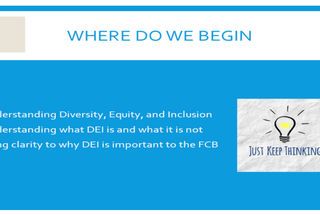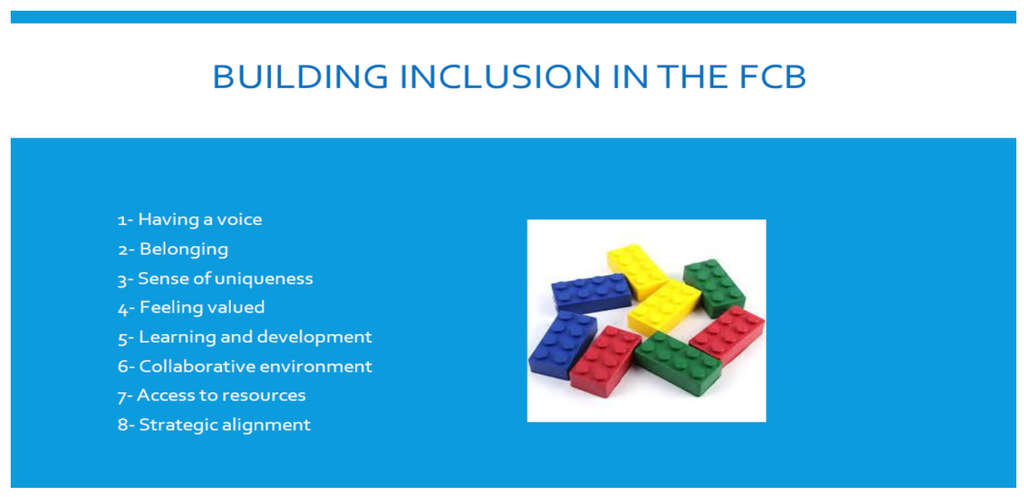Why Guest Inclusivity Is the Key to Success in 2021 & Beyond

Issues around diversity, equity, and inclusion (DEI) have been more front-and-center than ever in the past few years, with viral videos of racist incidents playing out on the world stage for everyone to see. Diverse and socially conscious consumers (especially Millennials and Gen Z) expect companies to demonstrate their commitment to DEI, and many will turn away from brands that don’t share their values. This paper will describe what DEI is, and also what it is not. It looks at the Hospitality industry (especially the spa segment) and at a College of Business where preparing future managers and leaders for a changing and diversified workforce is an integral component for successful graduates.
There has been a misconception in the industry that DEI initiatives are about political correctness, affirmative action, or quotas and will lead to bad hiring and negative business outcomes. Study after study has shown the opposite to be true when it comes to teams – in fact, organizations with inclusive cultures were six times more likely to be innovative and agile, eight times more likely to achieve better business outcomes, and twice as likely to meet or exceed financial targets. (Deloitte Review, Issue 22, January 2018)
A recent Accenture survey has shown that putting guest inclusivity at the heart of the travel experience can deliver serious benefits. In Accenture’s survey of more than 2,700 consumers, almost half of travelers said they would pay a premium of 5% to 20% to travel with a company that values diversity and inclusion. This represents a valuable opportunity for firms that make all guests feel welcome – regardless of gender, age, abilities, ethnicity, or sexual orientation.
The same survey also showed that companies that fail to act quickly enough and don’t have a strong culture of diversity and inclusion don’t just miss out on new customers, they also risk losing current ones. “Two out of five travelers – rising to more than half of ethnic minorities and those in the LGBT+ community – are prepared to switch providers if a company does not demonstrate its inclusive practices. Moreover, three in four will change brands if their preferred company doesn’t offer them a welcoming environment or treat them fairly. In total, these switching customers could cost travel companies $212 billion in lost revenues,” says John Spencer and Sarah Dillon of Accenture.
So how can hospitality, resort spa and wellness brands be more inclusive to ensure that they capture the diverse market and retain current customers?
1. START BY ADDRESSING REPRESENTATION IN MARKETING
As shown in the Accenture survey results, many travelers are paying close attention to whether hospitality brands are following through on the promises they made in the wake of protests and uprisings for social justice. Black travelers in particular are doubling down on supporting Black-owned businesses. A survey released in January 2021 by the consulting firm MMGY Global found that Black travelers, particularly those in the United States, Canada, the United Kingdom, and Ireland, are keenly interested in how destinations and travel service providers approach diversity and have indicated that it has an influence on their travel decision-making. Moreover, the international study also showed that how Black people are represented in marketing and advertising collateral plays a key role, with 54% of American Black travelers agreeing that they are more likely to visit a destination if they see Black representation in travel advertising. Another highly influential factor in the decision-making process is whether the destination is perceived as safe for Black travelers. Seventy-one percent of U.S. and Canadian respondents felt safety was extremely or very influential to their decision.
Representation is important. Accenture also found that 2 in 5 travelers care about public disclosures of diversity statistics, advertising images or the diversity of front-line employees. Diverse guests from marginalized communities are looking at your marketing materials to see if they are reflected in them, for cues that they will be welcome and safe. They want to visualize themselves enjoying your services.
Photography makes the biggest impact because at a glance, potential guests can see that you are inclusive and accommodating to a wide range of people. Your commitment to diversity and inclusion should also come across in your marketing copy – starting with your mission statement (or “about” page) through to the description of your services. Combined with diverse imagery, this also creates a sense of psychological safety for guests, as they will know in advance that your establishment is welcoming of who they are, and others like them. Remember, marginalized groups of people who likely have trauma in their history are looking for signs that they will be welcome and safe with you.
While representation in marketing is extremely important for diverse guests to feel safe to stay with you, it must be followed up with action all year round – not just on global “awareness days” or in response to calls for social justice – to be regarded as authentic.
2.ENSURE DEI IS AT THE HEART OF THE GUEST EXPERIENCE
It’s no longer adequate for hospitality, resort spa and wellness companies to view DEI as a branding exercise, PR move or a one-and-done training session. What matters most to guests now is a personal experience. According to the 2019 Accenture study, 82% of travelers value feeling welcomed and being treated fairly, while 74% care about whether the company offers products and services tailored to those in diverse segments. The study also showed that about 3 out of 5 travelers say it’s important that their preferred travel provider demonstrates D&I values similar to their own. That number rises to nearly 3 out of 4 among LGBTQ persons and (self-identifying) ethnic minorities, whose increasing spending power across the US, UK and Canada is well documented.
A few allied tour operators and hotel groups are diving deep into the demands for inclusivity. International tour operator R Family Vacations, the first travel company to create vacations for LGBT families and their friends, designs and leads LGBTQ family-friendly and adults-only trips on land and at sea for public groups and individuals.
Axel Hotels is an international hotel chain aimed at the LGBTIQ+ community. Founded in Barcelona in 2003, Axel Hotels focuses on the LGBTIQ+ community. Within their hotels is “a free and tolerant society,” where diversity and respect are valued, and everyone is equally welcome without prejudice to their sexual orientation. Axel Hotels is designed for the LGBTIQ+ audience but is open to everyone. They do not want to define Axel Hotels as gay-friendly, instead, they promote that they are hetero-friendly.
 For DEI-conscious LGTBQ+ supporters, Kimpton has tapped into the demand for inclusivity by offering queer-oriented promotions and packages and partnering with the Trevor Project. As their Premier National Hotel Partner, Kimpton supports the Trevor Project, an org that works tirelessly to provide 24/7 crisis intervention and suicide prevention for LGBTQ youth. Both Kimpton and the Trevor Project acknowledge that supporting a safe and judgment-free place for young people to go is crucial. With the Trevor Project offer, guests get 15% off their stay and Kimpton donates $10 per night to the Trevor Project.
For DEI-conscious LGTBQ+ supporters, Kimpton has tapped into the demand for inclusivity by offering queer-oriented promotions and packages and partnering with the Trevor Project. As their Premier National Hotel Partner, Kimpton supports the Trevor Project, an org that works tirelessly to provide 24/7 crisis intervention and suicide prevention for LGBTQ youth. Both Kimpton and the Trevor Project acknowledge that supporting a safe and judgment-free place for young people to go is crucial. With the Trevor Project offer, guests get 15% off their stay and Kimpton donates $10 per night to the Trevor Project.
There are a number of opportunities for spa and hospitality companies to tailor their offerings to meet the needs of specific groups of people who have been traditionally ignored or overlooked. Every department along the guest journey can put diversity and inclusion at the center of the experience.
A great example of this are the autism-friendly kids’ camps at Beaches resorts. Beaches is the first resort company to complete The International Board of Credentialing and Continuing Education Standards training and certification to provide autism friendly kids’ camps, custom dining options and other services, opening up luxury vacations to more families of children with special needs. Beaches also has a Culinary Concierge that guides guests through all of their restaurant offerings and helps create custom menus that fit families’ special dietary needs – including allergy restrictions and gluten-free, vegetarian, and vegan options. (F&B is another area where hotels and resorts need to be more inclusive and can immediately start implementing menus that provide guests with worry-free dining options.)
3. MAKE ALLYSHIP A VERB AND PRACTICE IT REGULARLY
In the wake of George Floyd’s death and the subsequent Black Lives Matter protests, a massive number of companies publicly demonstrated their support through official statements, social media posts (remember that black Instagram square?) and charitable donations. All pledged a commitment to racial justice and equity. It has become quite obvious, at least to BIPOC (Black, Indigenous, People of Color), that this was purely for show since wokeness has become a lucrative business strategy.
This show is also known as “optical allyship”, which only serves at the surface level. It makes a statement but “doesn’t go beneath the surface and is not aimed at breaking away from the systems of power that oppress,” explained Latham Thomas, who coined the phrase. “True allyship is about building trust, being consistent, standing up, speaking up, recognizing the struggle and carrying some of the weight.” If we want to create change beyond the black Instagram square, companies need to create a revolution from within. “Corporate America can no longer get away with token responses to systemic problems,” said Darren Walker, the president of the Ford Foundation and a member of Pepsi’s board. “It is going to take a systemic response to sufficiently address this crisis that has been decades in the making.”
What is an ally?
“An ally is any person that actively promotes and aspires to advance the culture of inclusion through intentional, positive and conscious efforts that benefit people as a whole,” says Sheree Atcheson, multi award-winning global diversity, equity, and inclusion leader.
What is allyship?
“At its most basic level, allyship is about having someone’s back. It’s the ongoing process of advocating, supporting, and being a voice for people whose voices aren’t being heard,” says Elissa Sangster, CEO of Forté, a nonprofit empowering woman to lead. Many of us became familiar with the word “ally” in reference to people who support LGBTQ rights and inclusion although they may not personally identify as LGBTQ. Today, the word is used to describe anyone who stands up for a marginalized person or group. Allies of underrepresented colleagues play a critical role in creating inclusive and respectful workplace cultures.
Atcheson outlines three fundamental tenets and define allyship as:
- a lifelong process of building relationships based on trust, consistency, and accountability with marginalized individuals and/or groups of people.
- not self-defined—work and efforts must be recognized by those you are seeking to ally with.
- an opportunity to grow and learn about ourselves, while building confidence in others.
Allyship and being an ally is a difficult practice. Everyone wants to be an ally until it actually comes time to be an ally. Allyship cannot be performative for good optics. Words and commitments must be followed by meaningful action — allyship has got to be a verb and practiced regularly.
Ashlee Fowlkes, an LGBTQ+ sensitivity and inclusion thought leader and CEO of Fowlkes Consulting, proposes a new model of allyship, one in which expectations are set for those that call themselves allies. The goal is not to call out those who fall short, but rather create a simple system to measure efforts. The following is a new model of allyship they propose called “Expectations of Allyship”:
Actionable Insights
Listen Generously
Lean Back/ Push Forward
Yield the Right of Way
Social Contracts
Honor Agreements
Identify Growth Opportunities
Privilege Sharing
From this new model, here are a couple of examples where spa, wellness and hospitality can start practicing true allyship: (read the details on the rest of the Expectations of Allyship list here)
Actionable Insights
“It is essential that, as an ally, you are intentionally gathering information about the group you wish to support. Once collected, the information can be utilized to identify next steps. Too often, it is the case that individuals want to skip directly to taking steps without having taken proper care to gain insight. The gaining of understanding and context is one of the many things that separates the ally from someone that seeks to take over. Allies should bring something to the table. They should not simply be takers. They should not merely be observers (a form of taking), but they should add value.”
Information gathering will allow you to identify needs, enabling you to be thoughtful in your offerings and increasing the likelihood that what you offer will bring value to the population served. The co-mingling of ideas and intentions (cross-pollination) separates an ally from someone who seeks only to take over or engage in cultural appropriation (usurpation).
Wellness menus or programming can suffer from cultural appropriation when the facility is located in an area with Indigenous people from a culture who have ancient wellness practices, such as Hawai’i, Mexico, and Australia. Practicing allyship in this area means intentionally gathering information from marginalized groups in order to thoughtfully and intentionally craft wellness services and programs. A great example of this is Sensei Lāna‘i’s Lomi Lomi and Lomi 'A'e bodywork services. These Hawaiian traditions of bodywork and healing are conducted by practitioner Maka Pico, a native Hawaiian, born and raised in the islands. Pico studied for many years under a Kumu (Hawaiian word for teacher, coach or guide) of Polynesian lomi to learn how to practice Lomi Lomi and Lomi A’e, the art of traditional Polynesian body walking (her specialty) and one of the most unique treatments offered at Sensei Lāna‘i. Pico begins each Lomi Lomi/Lomi A’e session with a pule, a Hawaiian for prayer or blessing, and a moment of silence before she begins. During that time, she listens for what the body needs. As Lomi A’e is an ancient art that is passed down, there are very few spas worldwide that even offer this.
Listen Generously
So, how does one go about obtaining the information referenced above? Information is obtained by way of not just listening but listening generously. Generous listening:
- Requires humility on the part of the listener.
- Is characterized by deference to expertise and an understanding that you are likely not the expert in the room.
- Requires deep listening, where you are seeking to understand and not to respond.
- Requires that you consider the voice of as many individuals as possible. It is imperative that the voice of one or two individuals not be generalized to an entire population or people group. Allies must take care to receive input from as many individuals as possible, given they are representative of that group.
On the team side, this looks like conducting DEI employee surveys at least once a year, tracking your progress on flagged issues throughout the year and ensuring that meaningful changes are made so that each employee feels seen, heard and respected.
On the guest side, this means generously listening to what diverse travelers and guests need when it comes to their travel or wellness experience, and thoughtfully incorporating their needs into each department.
Becoming An Actionable Ally
To be an ally, words and action must be in sync. Words without actions are performative, detrimental, and work against changing things for the better.
To be a true ally, you must:
- Lift others up by advocating
- Share growth opportunities with others
- Not view venting as a personal attack
- Recognize systematic inequalities and realize the impact of microaggressions
- Believe underrepresented people’s experiences
- Most importantly: listen, support, self-reflect and change.
Being an actionable ally can – and should – happen both on the management/team side and guest side. Following words with action is extremely important on the guest side, as that has a direct impact on your reputation and your revenue.
Allyship is work and will likely be extremely uncomfortable. But if you are going to be a true ally, you can’t choose your own comfort over doing what is right for both your company and your guests. Choosing comfort over DEI progress is not true allyship. When given the choice between comfort and progress, choose progress. Allyship is hard work, but the rewards for everyone are worth it.
As people start becoming increasingly aware and passionate about DEI challenges, travel, wellness, and hospitality organizations need to demonstrate their commitment or risk losing clientele. Studies show that an authentic, well-thought-through commitment to diversity, equity and inclusion drive loyalty and growth. By ensuring that all guests feel welcome, spa and hospitality organizations will win new customers while building enduring relationships with their existing clientele. In a rapidly changing and highly competitive sector, DEI is fast becoming travel companies’ most-sought-after amenity.
*Acknowledgment: This research sponsored by the GloMed.Education website.





